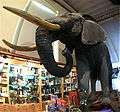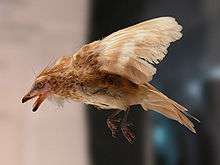Museo Nacional de Ciencias Naturales
| Museo Nacional de Ciencias Naturales | |
_01.jpg) Museum's building | |
 Location within Spain | |
| Established | 1910 |
|---|---|
| Location | Madrid, Spain |
| Coordinates | 40°26′28″N 3°41′25″W / 40.441036°N 3.690292°W |
| Type | Natural history museum |
| Visitors | 500,000 per year |
| Director | Esteban Manrique Reol |
| Website |
www |
The Museo Nacional de Ciencias Naturales (Spanish: National Museum of Natural Sciences) is the National Museum of Natural History of Spain. It is situated in the center of Madrid, by the Paseo de la Castellana. It is managed by the Spanish National Research Council.
The Museum was created in 1772 by Charles III of Spain as the Gabinete Real de Historia Natural, changing names several times until its current denomination.[1] The museum originally hosted a collection donated by a Spanish merchant, Pedro F. Dávila. In 1867, some facilities were separated to give birth to other museums (Archeology, Botanic Garden, Zoologic Garden). In 1987 the museum was restructured and grown with funds from two smaller museums.
Some of the more relevant components of the Museum collections are:
- A Megatherium brought from Argentina in 1789.
- A Diplodocus donated by Andrew Carnegie to Alfonso XIII of Spain
The museum shares a big building, the Palacio de Exposiciones de las Artes e Industrias with the Industrial Engineering School of the Technical University of Madrid.
The research departments of the museum are:
Gallery

-Sala_de_Historia_Natural.jpg) Section of Natural History
Section of Natural History
Diplodocus and other fossils Section of Natural History
Section of Natural History
Megatherium skeleton Section of Natural History
Section of Natural History
Iberomesornis model-Gorgonia.jpg) Mediterranean section
Mediterranean section
Gorgonian-Architeuthis.jpg) Mediterranean section
Mediterranean section
Giant squid model
References
- ↑ "Historia del Museo". Museo Nacional de Ciencias Naturales. Retrieved 20 January 2013.
External links
![]() Media related to National Museum of Natural Sciences of Spain at Wikimedia Commons
Media related to National Museum of Natural Sciences of Spain at Wikimedia Commons